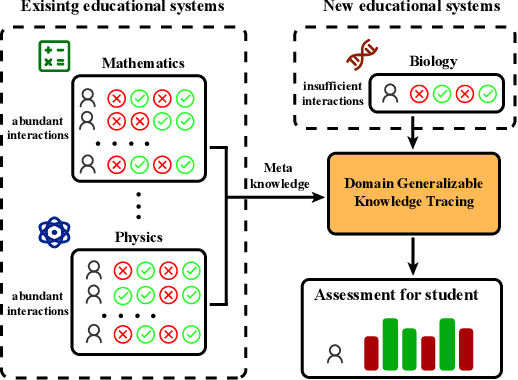Domain Generalizable Knowledge Tracing via Concept Aggregation and Relation-Based Attention
Paper and Code
Jul 02, 2024



Knowledge Tracing (KT) is a critical task in online education systems, aiming to monitor students' knowledge states throughout a learning period. Common KT approaches involve predicting the probability of a student correctly answering the next question based on their exercise history. However, these methods often suffer from performance degradation when faced with the scarcity of student interactions in new education systems. To address this, we leverage student interactions from existing education systems to mitigate performance degradation caused by limited training data. Nevertheless, these interactions exhibit significant differences since they are derived from different education systems. To address this issue, we propose a domain generalization approach for knowledge tracing, where existing education systems are considered source domains, and new education systems with limited data are considered target domains. Additionally, we design a domain-generalizable knowledge tracing framework (DGKT) that can be applied to any KT model. Specifically, we present a concept aggregation approach designed to reduce conceptual disparities within sequences of student interactions from diverse domains. To further mitigate domain discrepancies, we introduce a novel normalization module called Sequence Instance Normalization (SeqIN). Moreover, to fully leverage exercise information, we propose a new knowledge tracing model tailored for the domain generalization KT task, named Domain-Generalizable Relation-based Knowledge Tracing (DGRKT). Extensive experiments across five benchmark datasets demonstrate that the proposed method performs well despite limited training data.
 Add to Chrome
Add to Chrome Add to Firefox
Add to Firefox Add to Edge
Add to Edge